Session on Malaria Economics Research Priorities at the 65th Annual ASTMH Meeting
Categories: Announcements
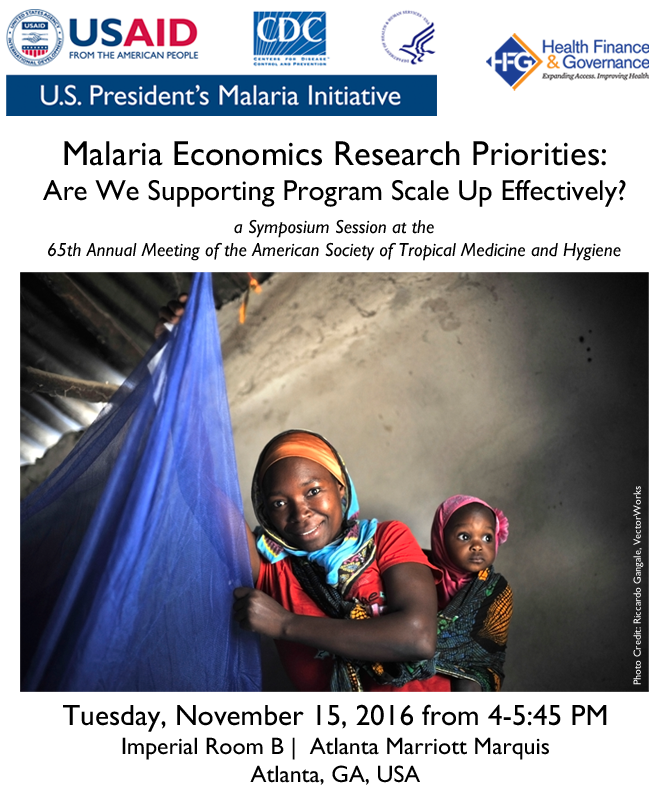 The USAID Health Finance and Governance (HFG) Project and the President’s Malaria Initiative (PMI) hosted a symposium session on Tuesday, November 15th from 4-5:45 pm, at the 65th Annual Meeting of the American Society of Tropical Medicine and Hygiene in Atlanta, GA.
The USAID Health Finance and Governance (HFG) Project and the President’s Malaria Initiative (PMI) hosted a symposium session on Tuesday, November 15th from 4-5:45 pm, at the 65th Annual Meeting of the American Society of Tropical Medicine and Hygiene in Atlanta, GA.
While significant progress has been made to reduce malaria mortality, there is still work to be done to lower–and ultimately eliminate–the incidence and morbidity of malaria. The push for elimination in some countries has raised the bar for researchers and implementers. Current domestic and international resources are inadequate to support control efforts, and countries must improve the mobilization and use of domestic resources to move closer to elimination.
Malaria economics research (MER) provides critical information on the efficiency and multisectoral impact of malaria interventions. MER typically takes one of two approaches: (1) broad and generalizable results (e.g. multi-country meta-analyses of interventions); and (2) local and specific results (e.g. a single country/setting study of a single malaria intervention). Whatever the approach, MER must inform users’ programmatic, resource allocation, and funding decisions for malaria. Given limited resources, funders and researchers must prioritize these economic analyses, ensuring that research funds are allocated effectively to answer the most pressing questions facing policymakers and programmers.
This symposium generated a lively discussion about the utility of different types of economic research, and began with presentations of two recent economic research studies:
- A Roll Back Malaria-funded multi-country cost-benefit analysis to quantify the potential returns of investing to achieve the 2030 malaria goals;
- A PMI-funded country-level analysis of the cost-effectiveness of malaria prevention and control intervention packages in Senegal.
Presentations highlighted key findings, and how they address policymakers’ and programmers’ needs.
About the Speakers
 Sophie Faye, PhD
Sophie Faye, PhD
Dr. Sophie Faye is a health economist with expertise in cost and cost effectiveness analysis, health financing, and efficiency analysis. At Abt Associates, she provides technical leadership in economic and costing analyses to the Health Finance and Governance Project. Relevant activities include efficiency analyses of health care delivery systems, programs, and models, costing health institutions and programs, and insurance schemes. Dr. Faye’s exposure to development work started in Senegal, with an International Labour Organization project and then a local NGO, Enda Tiers Monde, promoting community-based health insurance for low income families. She received her PhD in Health Economics from Suffolk University.
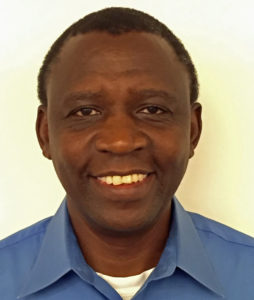 Martin Alilio, PhD
Martin Alilio, PhD
Dr. Martin Alilio is the Operational Research Coordinator for the President’s Malaria Initiative within USAID’s Bureau of Global Health Office of Health, Infectious Disease, & Nutrition. He has 26 years of malaria control and health system strengthening experience. Prior to joining USAID, he worked for the US National Institutes of Health, Academy for Educational Development, and the National Institutes of Medical Research in Tanzania. Martin has worked extensively in Africa with focused experience in Angola, Nigeria, Tanzania, Uganda, and Zimbabwe. He has also been a technical adviser to the Global Fund to Fight Tuberculosis, Malaria and HIV AIDS and has a PhD in Health Planning from University of Copenhagen Denmark.
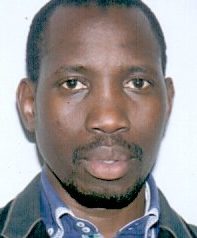 Alioune Badara Gueye, MD, MPH
Alioune Badara Gueye, MD, MPH
Dr. Gueye serves as the Case Management, Training, and Research Officer within Senegal’s National Malaria Control Program, and is a senior manager within the NMCP. He has been a key contributor to the strategic planning and evaluation of the NMCP including the developing of a five-year plan from 2016 to 2020 and bimonthly and quarterly reports to key stakeholders such as the Global Fund. Dr. Gueye establishes and implements research agendas within the NMCP and implements national campaigns to support LLIN coverage, and seasonal malaria chemoprevention. He is also responsible for training health agents on National Guidelines for Prevention and Treatment and coordinating the National Malariology Course to improve the management of malaria at the local level.
 Amadou BAH, PhD
Amadou BAH, PhD
Dr. Amadou BAH gained his PhD degree from Ecole Normale Supérieure de Lyon (France) and Université de Sherbrooke (Canada), and worked as a postdoctoral researcher at the Institute of Biochemistry of ETH Zurich (Switzerland). He is currently pursuing an MBA in International Health Management from the Swiss Tropical and Public Health Institute, and works as a Public Health Consultant. During 2014-2015 he supported the development of the Roll Back Malaria Partnership’s “Action and Investment to defeat Malaria 2016-2030 (AIM) – for a malaria-free world”. His work focused on quantifying the public health and economic benefits of achieving the 2030 global malaria goals, establishing the return on the US$100 billion investment that is needed for their achievement, as well as calculating the potential costs of malaria resurgence and failure.
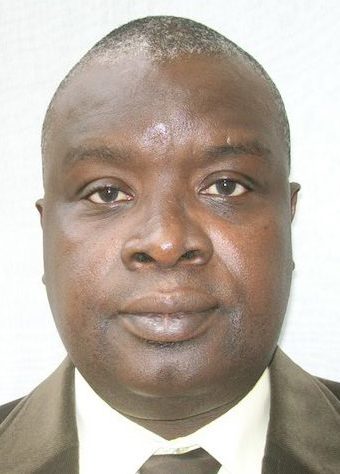 Ibrahima Seck, MD, MPH, PhD
Ibrahima Seck, MD, MPH, PhD
Dr. Ibrahima Seck is the Director of Studies at the Institute for Health and Development (ISED) at Cheikh Anta Diop University (UCAD) in Dakar, Senegal. As a public health specialist and medical doctor, he also consults on the planning, management, and M&E of malaria projects and other health programs for various international bodies including the WHO, World Bank, and Roll Back Malaria. Prior to joining ISED/UCAD, Dr. Seck served as the coordinator of the National Tuberculosis Program in Senegal. Dr. Seck has produced more than 50 publications in national and international journals and his work has been presented at numerous scientific congresses and meetings around the world. He holds an MD in Tropical Medicine and a Certificate of Specialization in Public Health, as well as an MA in International Development, and a PhD in Public Health, both from Tulane University.
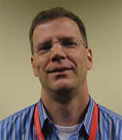 Ben Johns, MPA, PhD
Ben Johns, MPA, PhD
Dr. Benjamin Johns has worked since 2001 in international health settings on cost, cost-effectiveness, cost and budget projections, health insurance costs, evaluation and research, and data analysis, econometric techniques, financial and actuarial analyses. He began his career at WHO in Geneva developing and applying methods for generalized cost-effectiveness analysis (WHO-CHOICE), and on global ‘price tags’ for advocacy purposes, and now leads research efforts funded by both USAID and PMI on the Health Finance and Governance Project. Dr. Johns holds a PhD in International Health from Johns Hopkins University. He is a co-author on over 25 articles in peer-reviewed publications, and has published three book chapters.



